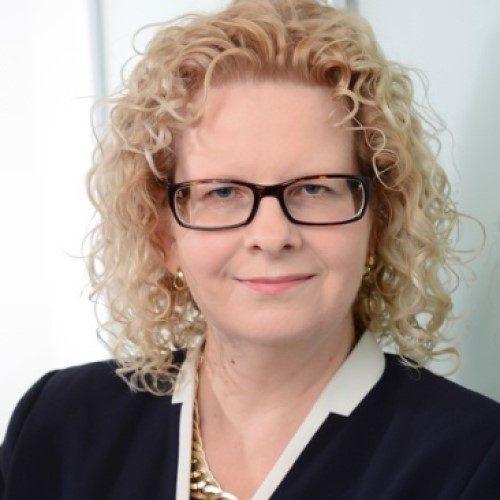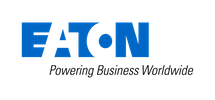Winning the Race to Net Zero With Karina Rigby, President, Critical Systems, EMEA

Karina discusses why she chose Eaton for the next step in her career, what other women can learn from the challenges she’s faced, and how Europe can accelerate its push towards a low-carbon future dominated by renewables.
A new power paradigm
“This is by far the most exciting time I’ve seen in the energy sector,” says Karina, an industry expert with over 25-years’ experience—spanning power generation, transmission and distribution, renewables, digitalization, and smart cities. “Across Europe, the ambition to achieve net zero is turning into action. A major change is happening, and I think we’re ideally positioned at Eaton to accelerate the energy transition to a carbon-neutral society.”
As president, Critical Systems, Electrical Sector, for Eaton’s Europe, Middle East and Africa Region, Karina’s role puts her at the heart of seizing this growth opportunity. Her responsibilities include driving the end-to-end value chain for low and medium voltage electrical systems, distributed power quality, critical power systems, and life safety.
“We’re uniting wide-ranging teams and capabilities to build complete solutions for whole sectors—from data centers, buildings, and utility providers.”
Karina Rigby, president, Critical Systems, Electrical Sector, EMEA
Karina joined Eaton in July 2021 because she agreed with the company’s strategy and knew it was a company where she could make a difference. “I’m very proud to be at Eaton,” she continues, “it’s the perfect place for me to drive the crucial transition towards decentralized renewable generation, electrification, and intelligent digital management that’s absolutely vital to achieving Europe’s net zero goals.”
According to Karina, these advances have the potential to drive a 60% reduction in European emissions by 2030, compared to today. “We’re forging a new power paradigm,” she continues, “creating a system that’s more resilient, stable, flexible and—crucially—sustainable. It’s a vital effort that will address both climate change and air pollution, as well as enable more reliable, efficient, and affordable access to energy for everyone.”
Enabling ‘Everything as a Grid’
Eaton’s approach to reinventing the way power is distributed, stored, and consumed is called ‘Everything as a Grid’ and it’s a concept that underpins Karina’s thinking. “Power production used to be very centralized,” she says. “It flowed downstream through a transmission and distribution network to homes, businesses, factories, and so on. It’s a system that’s taken us a long way, but now it needs to change for us to continue the march towards net zero.”
For Karina and Eaton, the future of power is more flexible, more dynamic, and more intelligent. “On the generation side, renewables are growing fast. In Europe, wind and solar power are projected to approach 60% of total generation by 2030. However, that will also increase grid volatility because the sun doesn’t always shine and the wind doesn’t always blow. Meanwhile, on the demand side, electricity needs are also skyrocketing, with data centers set to almost double their requirements by 2030. That will only increase further as sector coupling continues, with more and more industries abandoning fossil fuels and electrifying consumption.”
According to Karina, meeting this challenge of variable renewable generation and rising electricity requirements means harnessing demand-side assets to add flexibility to the grid.
“It’s simply not feasible to build out huge amounts of back-up power generation,” she says, “so we need to focus on demand-side flexibility. Fortunately, there are already assets out there we can use—such as the batteries in electric vehicles and the uninterruptible power supplies in data centers. We also need intelligent power management to balance the system, because electricity will no longer flow one-way through the grid, but back and forth.”
In particular, Eaton sees data centers as playing a vital role in stabilizing this much more dynamic system, while also enabling their operators to monetize otherwise underused UPS assets. BloombergNEF’s recent report, in partnership with Eaton and Statkraft, found that data centers could provide very significant flexibility across five key European markets. Eaton is also already working with major hyperscale and colocation data center players like Microsoft to enable grid stabilization with its EnergyAware solution.
In Karina’s view, reaching the flexibility required for a net-zero energy system is also just as much about the right policies and regulation as technology. “Demand-side players weren’t previously involved in the grid, so policymakers need to incentivize electric vehicle owners and data center operators to sell flexibility services. That means building the business case, clarifying the current rules, and making participation easier with advances like smart billing.”
Unlocking the power of diversity
Eaton’s diverse expertise puts it in a unique position to accelerate this looming energy transition. The company’s solutions can be found inside everything from cars, trucks and planes, to homes, hospitals, factories, and data centers. Meanwhile, the expertise of its varied teams spans microgrids, digitalization, energy storage, intelligent power management, and much more.
“We’re ideally situated to drive change both behind and in front of the meter,” says Karina, “and a key part of my role is bringing the different pieces of our business together to enable our ‘Everything as a Grid’ approach. We’re uniting wide-ranging teams and capabilities to build complete solutions for whole sectors—from buildings and vehicles, to manufacturers and utility providers.”
Eaton places significant importance on the diversity of its teams—emphasizing the need for different perspectives, backgrounds, and ways of thinking in accelerating innovation. For Karina, this commitment to inclusion and empowerment was one of the major reasons she knew Eaton was the right career move for her.
“Eaton really walks the talk on inclusion and diversity,” she says. “After my interviews, I knew this was a company that had the right strategy and the right market—but that wouldn’t have mattered if I couldn’t be myself. Fortunately, I was also convinced that I wouldn’t find prejudice here. I could see this was somewhere that looks at people as individuals, that values different perspectives, and that gives everyone the same opportunities to add value to the business. This was visible to me from the board level all the way down through the organization.”
Eaton’s varied inclusion Employee Resource Groups are just one of the ways it enables diverse employees, to bring together people who share a common purpose, interest, or background to drive equality and acceptance in the workplace. Today, these iERGs have more than 10,000 members. Eaton was also named one of the leading companies in Europe for diversity and inclusion in the Financial Times’ latest Diversity Leaders ranking.
Karina has led a stellar career, from her undergraduate degree and doctorate in engineering at the Massachusetts Institute of Technology, right through to senior management roles at major global companies—driving double-digit growth and sealing multi-million dollar deals. However, even she has experienced workplace sexism in the past.
“I’ve seen managers openly state they won’t hire women, and I’ve even had senior leaders tell me that women can’t think three-dimensionally,” she says. “Culturally, things are certainly improving and I hope that young women today will not have these kinds of experiences. But it really does bring home the importance of being in an organization that appreciates you, that wants you to succeed, and that gives you a path forward. That’s a big reason I felt comfortable taking my role at Eaton. For instance, people here will say ‘he/she/they’ when talking about plant managers, which is only a small thing, but it really demonstrates a different attitude and mindset than I’ve experienced at some other companies.”
Fake it until you make it
Growing up in Washington state in the U.S., Karina showed an early talent for engineering. “At school, I was the girl who wanted to learn how to weld,” she says. “I was the only girl who entered a national competition for technical drawing. And I didn’t speak to my father for a week after he built a workbench for my brother, but not for me!”
Karina believes no one should be afraid of pursuing a career in engineering and technology because of potential prejudices. “Don’t be afraid to stand out,” she advises, “I think there’s power and magic in being different, it makes you much stronger than just trying to fit in.”
In fact, Karina sees more women entering technology and engineering roles as crucial to driving change. “The more successful women we have in senior positions, the more we’ll erode biases and make things easier for the next generation,” she adds. “Don’t let perceived gender norms dictate your life.”
Looking back over her career, Karina recommends that young women seize new opportunities whenever they arise. “Don’t be afraid to step out of your comfort zone,” she advises. “I know that can be scary, but if you take the path of least resistance, you’ll end up in the place of least resistance too. You need to grab each new opportunity and, if opportunities don’t appear, you need to make them for yourself.”
For Karina, a good example of this is making an impact in leadership meetings. “If you’re in a meeting with key decision-makers, you need to shine. These chances don’t come up often, so lean in, speak up, and show what you can do. You’ll be amazed how many new doors that can open.”
Equally, Karina recommends being flexible in your career to maximize the opportunities that come your way. “Being prepared to move location really increases the new roles you can take on. And each new role also grows your network of contacts, which will snowball into even more opportunities in the future.”
Karina also praises Eaton’s commitment to supporting people on this journey of learning and development, through mentoring programs, Eaton University courses, leadership training sessions, and more. “It’s definitely a place that encourages you to keep expanding your horizons,” she adds.
As for facing new challenges and taking on leadership positions, Karina recommends faking it until you make it. “It’s really the only viable approach,” she comments, “otherwise you’ll never do anything new because you’ve never done it before. For example, every single person who leads people for the first time has never done it before. But a lack of confidence will show through. Fake your confidence until it materializes in reality. You just have to act confidently. It will pay off.”

